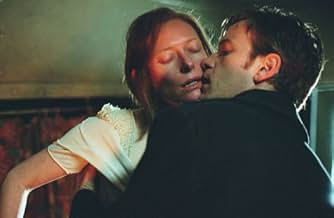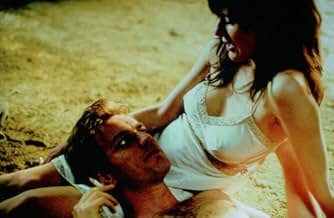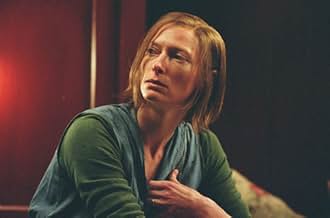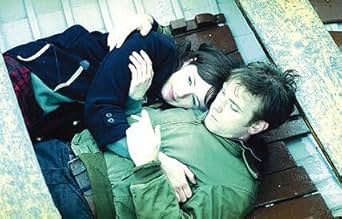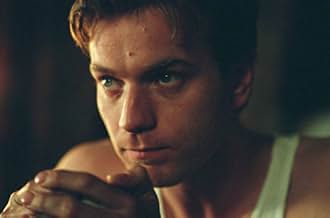A young drifter working on a river barge disrupts his employers' lives while hiding the fact that he knows more about a dead woman found in the river than he admits.A young drifter working on a river barge disrupts his employers' lives while hiding the fact that he knows more about a dead woman found in the river than he admits.A young drifter working on a river barge disrupts his employers' lives while hiding the fact that he knows more about a dead woman found in the river than he admits.
- Director
- Writers
- Stars
- Awards
- 7 wins & 17 nominations total
- Director
- Writers
- All cast & crew
- Production, box office & more at IMDbPro
Featured reviews
Who is Alexander Trocchi? He's the author of a Brit Beat cult novel called Young Adam and a fascinating figure of whose writing William S. Burroughs once said `He has been there and brought it all back.' Fledgling Scottish director David Mackenzie has brought it all back to the screen, having performed the difficult feat of getting adequate funds to film Young Adam and gathered an able cast headed by Ewan MacGregor, Tilda Swinton, and Peter Mullen to act in it.
A worthwhile project and a logical one for those involved. It makes sense that MacGregor of Trainspotting and Shallow Grave and Mullen of Trainspotting should try to jumpstart British cinema again by bringing this bold forgotten classic set in Scotland to the screen. The result may not be a revolution, but it's a good watch, a beautiful dark lusty little movie with some rare nooks and crannies to it.
Indeed it was Trainspotting author Irvine Welsh who spearheaded the revival of interest in Trocchi and his novel. Glasgow-born Trocchi (who died in '84) spent so many years as a wild drug intellectual figurehead in Paris, the US, and England that people had pretty much forgotten he'd been a good writer admired for his style and his "sexistential" plots.
Besides being a heroin-opium-cocaine-marijuana addict, pimp, magazine editor, translator and rare book seller who never gave up the wan hope that he'd do some good writing again, Trocchi once also penned pornography for cash. His own lust sticks out all over this story, as does his freewheeling sensualist nihilism.
The sexually predatory Joe (MacGregor) is a failed writer with a dark secret who's run off to become a hired hand on a barge running coal along the Forth and Clyde canal between Glasgow and Edinburgh. Ella Gault -- a typically powerful, merciless role for the bold and talented Swinton -- is the barge owner, often contemptuous of her husband Les (Peter Mullen). It's obvious Joe and Ella are going to be between the sheets in short order. We suspect also that as in Jean Vigo's classic Parisian barge film L'Atalante, somebody's going to have to leave. The small world is made even smaller by the presence of a son, `the kid' Jim (Jack McElhone) who peeks through cracks to see the humping. This is the Kitchen Sink School of adultery.
Before long Les gets the picture and moves off, but we know from flashbacks and concurrent affairs that Joe is a stranger to commitment. Eventually it emerges that he knew a lot more than he said about the body of the girl in the slip he and Les fished out of the canal at the movie's outset. The story that unfolds about that body and its owner is a huge example of Joe's endless capacity for non-commitment. Could it be there's more than a little of Alexander Trocchi in Joe Taylor? You bet. But Joe's a pre-drug Trocchi whose only substances are the alcohol he gets in pubs and the cigarettes he always has dangling from his mouth.
The lusty nihilism of this story may owe something to Henry Miller, but it's more usually described as a sensual and earthy version of Camus's The Stranger, and like The Stranger, Young Adam has a trial at the end (it seems somewhat patched in, and it is it's not in the book). Joe experiences greater priapic pleasure than Camus's Meursault. He doesn't seem to get a lot of fun out of it, though. He's a failed author making it with every woman who comes along to forget his writer's block and his guilt. He's a handsome, sexy devil who doesn't so much seduce women as look them in the eye and wait to pounce. It's hard to see how anybody else could be better than Ewan McGregor in this role. Working on home turf again for a change -- like Colin Farrell in the casual, quick-witted recent Irish film Intermission -- MacGregor has never looked or acted better. Swinton, Mullen, and Emily Mortimer (as the former girlfriend) are equally good.
Mackenzie's postwar Glasgow canal world is an authentic-feeling place where the interiors are chiaroscuro and exteriors bleached out and tinged with yellow. The shots are often striking in unexpected ways. The trouble with the movie is it isn't emotionally affecting. The wild sex scenes including the notorious ketchup rape -- are no more than bodies rudely colliding. There's more beauty in the arch of McGregor's eyebrows or the rust of a barge in the late sunlight. There's a grimy glamour also to the barge interiors, the luminous air of the pubs, canalside humps and slick dark streets; but the hero's aimlessness destroys momentum and the movie fizzles out at the end.
As Joe drifts through Young Adam the present is mixed with the flashbacks of an equally aimless past and things get a bit confusing. There isn't any of the acid trip intensity (and ultimate clarity) of Cronenberg's brilliant Spider and the pace drags at times. Let's hope Mackenzie's work on his next movie pans out: it's an adaptation of Spider author Patrick McGrath's novel Asylum. His first movie was a fiasco. This interesting effort is his second. With luck he may make another leap forward next time.
A worthwhile project and a logical one for those involved. It makes sense that MacGregor of Trainspotting and Shallow Grave and Mullen of Trainspotting should try to jumpstart British cinema again by bringing this bold forgotten classic set in Scotland to the screen. The result may not be a revolution, but it's a good watch, a beautiful dark lusty little movie with some rare nooks and crannies to it.
Indeed it was Trainspotting author Irvine Welsh who spearheaded the revival of interest in Trocchi and his novel. Glasgow-born Trocchi (who died in '84) spent so many years as a wild drug intellectual figurehead in Paris, the US, and England that people had pretty much forgotten he'd been a good writer admired for his style and his "sexistential" plots.
Besides being a heroin-opium-cocaine-marijuana addict, pimp, magazine editor, translator and rare book seller who never gave up the wan hope that he'd do some good writing again, Trocchi once also penned pornography for cash. His own lust sticks out all over this story, as does his freewheeling sensualist nihilism.
The sexually predatory Joe (MacGregor) is a failed writer with a dark secret who's run off to become a hired hand on a barge running coal along the Forth and Clyde canal between Glasgow and Edinburgh. Ella Gault -- a typically powerful, merciless role for the bold and talented Swinton -- is the barge owner, often contemptuous of her husband Les (Peter Mullen). It's obvious Joe and Ella are going to be between the sheets in short order. We suspect also that as in Jean Vigo's classic Parisian barge film L'Atalante, somebody's going to have to leave. The small world is made even smaller by the presence of a son, `the kid' Jim (Jack McElhone) who peeks through cracks to see the humping. This is the Kitchen Sink School of adultery.
Before long Les gets the picture and moves off, but we know from flashbacks and concurrent affairs that Joe is a stranger to commitment. Eventually it emerges that he knew a lot more than he said about the body of the girl in the slip he and Les fished out of the canal at the movie's outset. The story that unfolds about that body and its owner is a huge example of Joe's endless capacity for non-commitment. Could it be there's more than a little of Alexander Trocchi in Joe Taylor? You bet. But Joe's a pre-drug Trocchi whose only substances are the alcohol he gets in pubs and the cigarettes he always has dangling from his mouth.
The lusty nihilism of this story may owe something to Henry Miller, but it's more usually described as a sensual and earthy version of Camus's The Stranger, and like The Stranger, Young Adam has a trial at the end (it seems somewhat patched in, and it is it's not in the book). Joe experiences greater priapic pleasure than Camus's Meursault. He doesn't seem to get a lot of fun out of it, though. He's a failed author making it with every woman who comes along to forget his writer's block and his guilt. He's a handsome, sexy devil who doesn't so much seduce women as look them in the eye and wait to pounce. It's hard to see how anybody else could be better than Ewan McGregor in this role. Working on home turf again for a change -- like Colin Farrell in the casual, quick-witted recent Irish film Intermission -- MacGregor has never looked or acted better. Swinton, Mullen, and Emily Mortimer (as the former girlfriend) are equally good.
Mackenzie's postwar Glasgow canal world is an authentic-feeling place where the interiors are chiaroscuro and exteriors bleached out and tinged with yellow. The shots are often striking in unexpected ways. The trouble with the movie is it isn't emotionally affecting. The wild sex scenes including the notorious ketchup rape -- are no more than bodies rudely colliding. There's more beauty in the arch of McGregor's eyebrows or the rust of a barge in the late sunlight. There's a grimy glamour also to the barge interiors, the luminous air of the pubs, canalside humps and slick dark streets; but the hero's aimlessness destroys momentum and the movie fizzles out at the end.
As Joe drifts through Young Adam the present is mixed with the flashbacks of an equally aimless past and things get a bit confusing. There isn't any of the acid trip intensity (and ultimate clarity) of Cronenberg's brilliant Spider and the pace drags at times. Let's hope Mackenzie's work on his next movie pans out: it's an adaptation of Spider author Patrick McGrath's novel Asylum. His first movie was a fiasco. This interesting effort is his second. With luck he may make another leap forward next time.
What an emotionless portrayal of an emotionless man. Ewan yet again proves that he is a force in both the Hollywood community and in the independent forum. Not only for having the bravery to go against American cliché and fight to keep his full frontal nudity in the film, but also for having the gumption to take this role. This is not your average character. Joe is not your normal 'hero'. In fact, I would go so far as to say that he represents all of us. He is, sadly, our 'hero'. Joe (and Ewan portrays this perfectly) is constantly looking for happiness and acceptance, but somehow cannot find it due to the sexual urges that he has. It is interesting to see him want to have emotion, but yet have no issues with sleeping with another man's wife. This is a story of maturity for Joe, but sadly we do not ever see it. When I was watching this film I was continually thinking of the film Alfie (not the new release, but the older) in which a man embarks on several relationships and ultimately ends up with nothing. That is very similar to the story that we have here, only Young Adam is much grittier and darker
and, well, more explicit.
So many times in cinema we watch two actors give heartbreaking performances on screen, but just do not have the chemistry needed to really pull together those intense sex scenes. That is not the case here. The chemistry and raw emotion between Ewan and Tilda Swinton is phenomenal. I have not seen a better match up in cinema in a long time. This successfully added that extra intensity to their moments of glory. I was able to feel and see their emotion and passion for each other on the screen. It was exactly what this film needed to reach the next level.
I know this story is based off a book, but I felt that director David Mackenzie did a fantastic job of setting the mood and the scenes. He amazingly built this sense of claustrophobia that surrounded Joe from not only inside the boat, but also under the truck and in the second apartment. There was even that feeling at the trial. This claustrophobia is one of the reasons why Joe never stays in one place for very long. While some will argue that he is nothing more than a heartless womanizer and a coward, I saw him as a tragic spirit searching for the lifelong happiness that he could never find. His conscious was too heavy on him to ever find that perfect place. Mackenzie allowed Ewan to find this character, and this powerful drama was transformed well into the screen.
Finally, I would like to add that Ewan would not have been worth seeing in this film if it wasn't for the impressive Tilda Swinton who is seemingly in everything lately and gives nothing less than 110%. I have not seen anything that she has been in that was anything below good. She is our next Oscar winner and one of those actresses that are not afraid to get dirty. Her portrayal of Ella is no different. While others would have simply just played the part, Swinton creates the part and gives this film the backbone that it deserves. She nearly steals every scene from Ewan, and that is impressive.
Overall, Young Adam is a deeply disturbing and depressing film that is not for everyone, but will be enjoyed by those that are fans of this genre.
Grade: **** out of *****
So many times in cinema we watch two actors give heartbreaking performances on screen, but just do not have the chemistry needed to really pull together those intense sex scenes. That is not the case here. The chemistry and raw emotion between Ewan and Tilda Swinton is phenomenal. I have not seen a better match up in cinema in a long time. This successfully added that extra intensity to their moments of glory. I was able to feel and see their emotion and passion for each other on the screen. It was exactly what this film needed to reach the next level.
I know this story is based off a book, but I felt that director David Mackenzie did a fantastic job of setting the mood and the scenes. He amazingly built this sense of claustrophobia that surrounded Joe from not only inside the boat, but also under the truck and in the second apartment. There was even that feeling at the trial. This claustrophobia is one of the reasons why Joe never stays in one place for very long. While some will argue that he is nothing more than a heartless womanizer and a coward, I saw him as a tragic spirit searching for the lifelong happiness that he could never find. His conscious was too heavy on him to ever find that perfect place. Mackenzie allowed Ewan to find this character, and this powerful drama was transformed well into the screen.
Finally, I would like to add that Ewan would not have been worth seeing in this film if it wasn't for the impressive Tilda Swinton who is seemingly in everything lately and gives nothing less than 110%. I have not seen anything that she has been in that was anything below good. She is our next Oscar winner and one of those actresses that are not afraid to get dirty. Her portrayal of Ella is no different. While others would have simply just played the part, Swinton creates the part and gives this film the backbone that it deserves. She nearly steals every scene from Ewan, and that is impressive.
Overall, Young Adam is a deeply disturbing and depressing film that is not for everyone, but will be enjoyed by those that are fans of this genre.
Grade: **** out of *****
A thoughtful, unapologetic and non judgmental character study of Joe, one man, one distinctly unique yet common man. It is presented in the context of a mystery, but this is no mystery thriller. Thrill seekers, go elsewhere.
If you crave action, dialog, explanations and clear resolutions to a plot, I suggest you avoid this film. If you are fascinated by human complexity, admire beautifully crafted film-making, and can think and observe for yourself, this may be a rewarding experience for you. If you love and understand great acting you must see this film.
It is exquisitely filmed, in an understated and confident manner, using hue and tint as artfully as any great painter. Joe lives in a drab and uninspiring world, mostly of interiors; tight, constricted places, where the inhabitants are caged too closely, too much ever present in each other's spaces. When we are occasionally brought out into the world at large, this tight confining world is often seen to be surrounded by a distant, unreachable beauty. There are subtly beautiful panoramas of the lush greenness of Scotland off in the distance, out of reach of Joe, of all the people of his world.
The structure, the editing, the weaving of time present and time past is without conceit. There is no "look at how cleverly I did that transition" cutting. It is a perfect representation of editing unseen, unnoticed, the mark of brilliant editing. Everything comes together, simply and without explanation. Characters are presented simply, without prelude. Events occur, without justification. You must think and observe for yourself. If there are conclusions to be made, they must be yours.
If for no other reason, see this film to experience Ewan McGregor: He has been a reasonably attractive and adequate performer, in mostly rather forgettable productions, until now. Here he suddenly emerges as an actor of astounding depth and complexity, inhabiting, living, revealing another soul. Without any reservation this is a great performance. His subtlety, his inner directed creation of a complete individual, is simply remarkable. It is a complete, compelling, always true performance. You cannot look away from Joe. You must follow him, know him. Do you know him? Can you ever really know him?
The plot, what little of it there is, unfolds through character and behavior, with a minimum of dialog. There is much complete silence in this film. The score is understated, never telegraphing what you are supposed to feel or think. Indeed, I doubt that there is an answer to any question here. Who is Joe? What is Joe? That is not the point.
Here is Joe. This is what he is, this is what he has done. What will he do now? There is a quiet suspense, never quite gratified, which begins with the very first frame,a corpse, gently floating, photographed darkly, from below, so dark there is no face. A deceased, faceless female human being.
Joe's is the first face we see. That first glimpse of his eyes, told me that nothing would be what it seemed in this film. Joe sees something we do not see. So begins the mystery.
Nothing is jarring, nothing is false. Life is simply never quite what we think it is. Make no mistake. There is a real mystery here to be revealed. Not a contrived, plot dependent series of revelations. It is the unpeeling of the layers of a human being.
Much has been mentioned in this forum about the frequent sex scenes. They are achingly non-erotic, distanced and cold, and ultimately only functional. It is a passionless, desperate, mutually using and abusing kind of sex. Only one scene has heat. And that scene is not really sex. It is frustration, anger, vengeance, humiliation and desperation. This scene is truly horrible, truly frightening and truly revelatory.
I haven't told you much about the plot. That is deliberate. The plot works. It reveals the character. The progression of events is true, often surprising, but never false, never contrived. If you need to be told what is happening and why, this is not for you.
If you love great acting, by all involved, and appreciate the crafts and arts of film construction, I highly recommend "Young Adam".
(I have one question for anyone out there who might have a feasible answer: the title confounds me. There is no Adam. Nor is there any reference to an Adam. I could draw no path to or from Genesis. So why is this called "Young Adam"?)
If you crave action, dialog, explanations and clear resolutions to a plot, I suggest you avoid this film. If you are fascinated by human complexity, admire beautifully crafted film-making, and can think and observe for yourself, this may be a rewarding experience for you. If you love and understand great acting you must see this film.
It is exquisitely filmed, in an understated and confident manner, using hue and tint as artfully as any great painter. Joe lives in a drab and uninspiring world, mostly of interiors; tight, constricted places, where the inhabitants are caged too closely, too much ever present in each other's spaces. When we are occasionally brought out into the world at large, this tight confining world is often seen to be surrounded by a distant, unreachable beauty. There are subtly beautiful panoramas of the lush greenness of Scotland off in the distance, out of reach of Joe, of all the people of his world.
The structure, the editing, the weaving of time present and time past is without conceit. There is no "look at how cleverly I did that transition" cutting. It is a perfect representation of editing unseen, unnoticed, the mark of brilliant editing. Everything comes together, simply and without explanation. Characters are presented simply, without prelude. Events occur, without justification. You must think and observe for yourself. If there are conclusions to be made, they must be yours.
If for no other reason, see this film to experience Ewan McGregor: He has been a reasonably attractive and adequate performer, in mostly rather forgettable productions, until now. Here he suddenly emerges as an actor of astounding depth and complexity, inhabiting, living, revealing another soul. Without any reservation this is a great performance. His subtlety, his inner directed creation of a complete individual, is simply remarkable. It is a complete, compelling, always true performance. You cannot look away from Joe. You must follow him, know him. Do you know him? Can you ever really know him?
The plot, what little of it there is, unfolds through character and behavior, with a minimum of dialog. There is much complete silence in this film. The score is understated, never telegraphing what you are supposed to feel or think. Indeed, I doubt that there is an answer to any question here. Who is Joe? What is Joe? That is not the point.
Here is Joe. This is what he is, this is what he has done. What will he do now? There is a quiet suspense, never quite gratified, which begins with the very first frame,a corpse, gently floating, photographed darkly, from below, so dark there is no face. A deceased, faceless female human being.
Joe's is the first face we see. That first glimpse of his eyes, told me that nothing would be what it seemed in this film. Joe sees something we do not see. So begins the mystery.
Nothing is jarring, nothing is false. Life is simply never quite what we think it is. Make no mistake. There is a real mystery here to be revealed. Not a contrived, plot dependent series of revelations. It is the unpeeling of the layers of a human being.
Much has been mentioned in this forum about the frequent sex scenes. They are achingly non-erotic, distanced and cold, and ultimately only functional. It is a passionless, desperate, mutually using and abusing kind of sex. Only one scene has heat. And that scene is not really sex. It is frustration, anger, vengeance, humiliation and desperation. This scene is truly horrible, truly frightening and truly revelatory.
I haven't told you much about the plot. That is deliberate. The plot works. It reveals the character. The progression of events is true, often surprising, but never false, never contrived. If you need to be told what is happening and why, this is not for you.
If you love great acting, by all involved, and appreciate the crafts and arts of film construction, I highly recommend "Young Adam".
(I have one question for anyone out there who might have a feasible answer: the title confounds me. There is no Adam. Nor is there any reference to an Adam. I could draw no path to or from Genesis. So why is this called "Young Adam"?)
Young Adam is a powerful and atmospheric drama set on the canals between Glasgow and Edinburgh during the 1950s.
Ewan McGregor is Joe, a drifter working on a barge, when he and his boss find a body in the canal. As he begins an affair with the bargeman's wife (Tilda Swinton), we find out more about his previous relationship with the drowned woman (Emily Mortimer).
Adapted from the novel by Scottish Beat writer Alexander Trocchi, Young Adam is, in some ways, a kitchen sink drama a vivid picture of working class life in its unpleasant reality. One of the best examples of this type of film is Room at the Top (1959). But Young Adam has existentialist overtones: Joe is alienated and passive, and not only do his numerous sexual couplings offer him little pleasure, but in rejecting the only thing that could redeem him, he condemns himself to a meaningless life. This might sound too depressing, but screenwriter and director David Mackenzie gives the film great depth and sensuality. Very interesting. ****/***** stars.
Ewan McGregor is Joe, a drifter working on a barge, when he and his boss find a body in the canal. As he begins an affair with the bargeman's wife (Tilda Swinton), we find out more about his previous relationship with the drowned woman (Emily Mortimer).
Adapted from the novel by Scottish Beat writer Alexander Trocchi, Young Adam is, in some ways, a kitchen sink drama a vivid picture of working class life in its unpleasant reality. One of the best examples of this type of film is Room at the Top (1959). But Young Adam has existentialist overtones: Joe is alienated and passive, and not only do his numerous sexual couplings offer him little pleasure, but in rejecting the only thing that could redeem him, he condemns himself to a meaningless life. This might sound too depressing, but screenwriter and director David Mackenzie gives the film great depth and sensuality. Very interesting. ****/***** stars.
By halfway through this story, the biblical underpinnings become firmly apparent: this is an allegory for The First Man, and his base, animal instincts. Hence, it's a tried and true thematic device, used by many authors: for example, in the tradition of Saturday Night and Sunday Morning (1960), Sons and Lovers (1960), and many other films that explore sexual transgressions coupled with (no pun intended) unrelenting naked desire, the author, Alexander Trocchi, presents his version of the modern Adam – always on the make, and totally suffused with his own animal desires and his pretentious efforts at self-fulfillment.
In truth, the Young Adam of this story, Joe Taylor (Ewan McGregor) is portrayed as, at best, misanthropic and crypto-misogynistic. Taken to extreme, Young Adam could be borderline sociopath in another story and setting. This is not satire, however, as with Patrick Bateman (deliciously played by Christian Bale) in American Psycho (2000). No, this is a reality that existed in the 1950s setting of the novel and which remains a stigma within all humans today. In truth, I think it was St.Jerome, in one of the biblical stories, who moaned about his need for release from his sexual depravities. But, nothing much changes in human relationships, from antiquity to now.
In a manner, you can look at this story as Ingmar Bergman for the poorer masses – another version of dirty scenes from a dirty marriage: because in this plot, the unwashed Joe is presented with a moral dilemma as the story progresses: am I truly my brother's keeper? So, the question for him, finally, is: will he be able to rise above his animality and achieve a humanity that he has avoided throughout his young life to date?
McGregor's acting in this story is stunning; so also Tilda Swinton as Young Adam's latest sexual conquest (Ella) aboard a coal-carrying canal barge (aptly named Atlantic Eve) where he thinks he's escaping from his responsibilities. Poor Joe – he's such a slave to his desires, he just can't stop: on the barge, in alleyways, under trucks, on the floor, against a canal wall – anywhere for a quick hit, so that he can forget about his failure as an aspiring writer, among other things. To that extent, one is reminded of the controlled excesses in Last Tango in Paris (1972), where Marlon Brando gave his finest performance as another poor slave to animal passions. And, while on the topic, how can anybody forget sociopathic Frank Booth (Dennis Hopper) and his velvet fetish in Blue Velvet (1986)?
On the other hand, the same theme has been used for light or outrageous comedy with films such as Tom Jones (1963), Kubrick's masterpiece Barry Lyndon (1975) and Boogie Nights (1997), all worth seeing, simply because none hurt the psyche.
But, getting back to Joe – so ordinary Joe, a symbol for all men, young and older – as he fills his days as a canal-worker-slave, obtaining relief from boredom only when satisfying his slavish work in a different type of living canal. Significantly, the director has the barge enter a few dark, moist tunnels through which the barge travels – and with the men treading all over it, albeit somewhat delicately, and just enough to make sure they exit carefully.
You don't get symbols like that too often in films; a delight to savor, for the location and the execution.
The denouement for the story arrives when our Joe makes his moral choice – a choice so fundamental, you stare at his face, watching his look, the tortured eyes, the mouth, his eyebrows, all as an expression of the raging dilemma within his animal/human brain. Rarely will you see such a choice done so well, and with such resigned finality – and a mirror for all of us to ponder in our darkest hours.
The supporting cast is exemplary, while the photography, sound and editing match the needs for such an important – and yet ordinary – story to be portrayed so professionally. Occasionally, it was momentarily difficult to sort out past, present and future; but not so much that the structure caused any unresolved confusion.
The NC-17 and R ratings are appropriate: this is not a film for children or adolescents. But, I highly recommend it for all adults – young and old – who are not afraid to look critically within themselves.
May 10, 2011.
In truth, the Young Adam of this story, Joe Taylor (Ewan McGregor) is portrayed as, at best, misanthropic and crypto-misogynistic. Taken to extreme, Young Adam could be borderline sociopath in another story and setting. This is not satire, however, as with Patrick Bateman (deliciously played by Christian Bale) in American Psycho (2000). No, this is a reality that existed in the 1950s setting of the novel and which remains a stigma within all humans today. In truth, I think it was St.Jerome, in one of the biblical stories, who moaned about his need for release from his sexual depravities. But, nothing much changes in human relationships, from antiquity to now.
In a manner, you can look at this story as Ingmar Bergman for the poorer masses – another version of dirty scenes from a dirty marriage: because in this plot, the unwashed Joe is presented with a moral dilemma as the story progresses: am I truly my brother's keeper? So, the question for him, finally, is: will he be able to rise above his animality and achieve a humanity that he has avoided throughout his young life to date?
McGregor's acting in this story is stunning; so also Tilda Swinton as Young Adam's latest sexual conquest (Ella) aboard a coal-carrying canal barge (aptly named Atlantic Eve) where he thinks he's escaping from his responsibilities. Poor Joe – he's such a slave to his desires, he just can't stop: on the barge, in alleyways, under trucks, on the floor, against a canal wall – anywhere for a quick hit, so that he can forget about his failure as an aspiring writer, among other things. To that extent, one is reminded of the controlled excesses in Last Tango in Paris (1972), where Marlon Brando gave his finest performance as another poor slave to animal passions. And, while on the topic, how can anybody forget sociopathic Frank Booth (Dennis Hopper) and his velvet fetish in Blue Velvet (1986)?
On the other hand, the same theme has been used for light or outrageous comedy with films such as Tom Jones (1963), Kubrick's masterpiece Barry Lyndon (1975) and Boogie Nights (1997), all worth seeing, simply because none hurt the psyche.
But, getting back to Joe – so ordinary Joe, a symbol for all men, young and older – as he fills his days as a canal-worker-slave, obtaining relief from boredom only when satisfying his slavish work in a different type of living canal. Significantly, the director has the barge enter a few dark, moist tunnels through which the barge travels – and with the men treading all over it, albeit somewhat delicately, and just enough to make sure they exit carefully.
You don't get symbols like that too often in films; a delight to savor, for the location and the execution.
The denouement for the story arrives when our Joe makes his moral choice – a choice so fundamental, you stare at his face, watching his look, the tortured eyes, the mouth, his eyebrows, all as an expression of the raging dilemma within his animal/human brain. Rarely will you see such a choice done so well, and with such resigned finality – and a mirror for all of us to ponder in our darkest hours.
The supporting cast is exemplary, while the photography, sound and editing match the needs for such an important – and yet ordinary – story to be portrayed so professionally. Occasionally, it was momentarily difficult to sort out past, present and future; but not so much that the structure caused any unresolved confusion.
The NC-17 and R ratings are appropriate: this is not a film for children or adolescents. But, I highly recommend it for all adults – young and old – who are not afraid to look critically within themselves.
May 10, 2011.
Did you know
- TriviaEwan McGregor's nude scenes were originally going to be cut from the U.S. release, but after McGregor objected, the full-frontal nude scenes were put back in.
- GoofsIn a wide shot of the skyline of Glasgow from Kelvingrove Park, the Glasgow Tower can be seen on the horizon. The tower wasn't built until 2000.
- Quotes
Les Gault: What'd you do that for?
Joe Taylor: I had no use for it.
Les Gault: Must be worth something, though.
Joe Taylor: Not to me.
- Alternate versionsThe UK version contains a sex scene featuring Ewan McGregor. The MPAA has cut it from the US release for 2004.
- ConnectionsFeatured in Indie Sex: Censored (2007)
- How long is Young Adam?Powered by Alexa
Details
- Release date
- Countries of origin
- Official site
- Language
- Also known as
- Thời Trai Trẻ
- Filming locations
- Production companies
- See more company credits at IMDbPro
Box office
- Budget
- $6,400,000 (estimated)
- Gross US & Canada
- $767,373
- Opening weekend US & Canada
- $50,278
- Apr 18, 2004
- Gross worldwide
- $2,561,820
- Runtime1 hour 38 minutes
- Color
- Sound mix
- Aspect ratio
- 2.35 : 1
Contribute to this page
Suggest an edit or add missing content







